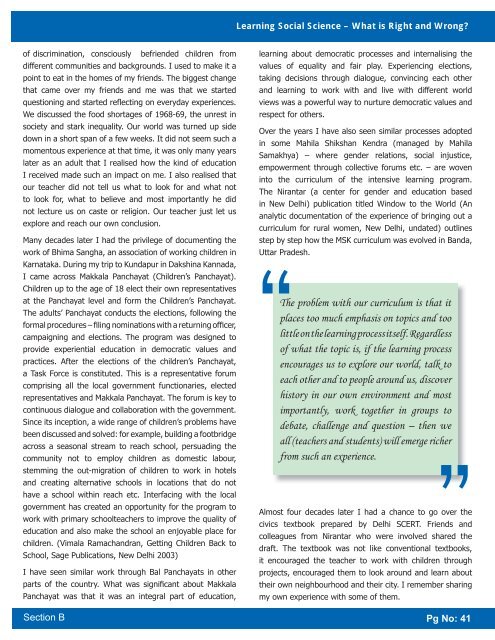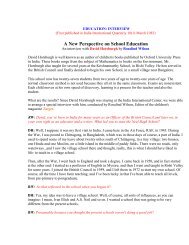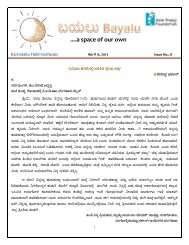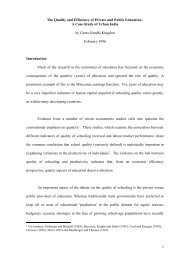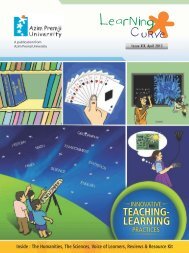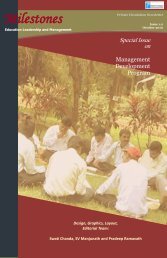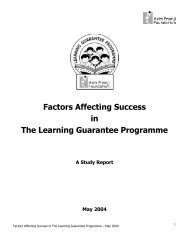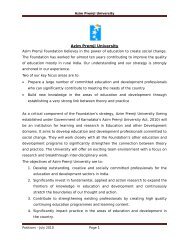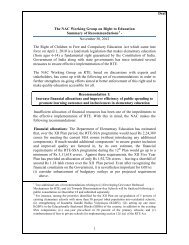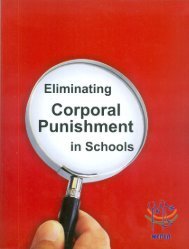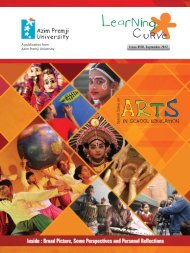Indesign Pagesnew.indd - Azim Premji Foundation
Indesign Pagesnew.indd - Azim Premji Foundation
Indesign Pagesnew.indd - Azim Premji Foundation
Create successful ePaper yourself
Turn your PDF publications into a flip-book with our unique Google optimized e-Paper software.
of discrimination, consciously befriended children from<br />
different communities and backgrounds. I used to make it a<br />
point to eat in the homes of my friends. The biggest change<br />
that came over my friends and me was that we started<br />
questioning and started refl ecting on everyday experiences.<br />
We discussed the food shortages of 1968-69, the unrest in<br />
society and stark inequality. Our world was turned up side<br />
down in a short span of a few weeks. It did not seem such a<br />
momentous experience at that time, it was only many years<br />
later as an adult that I realised how the kind of education<br />
I received made such an impact on me. I also realised that<br />
our teacher did not tell us what to look for and what not<br />
to look for, what to believe and most importantly he did<br />
not lecture us on caste or religion. Our teacher just let us<br />
explore and reach our own conclusion.<br />
Many decades later I had the privilege of documenting the<br />
work of Bhima Sangha, an association of working children in<br />
Karnataka. During my trip to Kundapur in Dakshina Kannada,<br />
I came across Makkala Panchayat (Children’s Panchayat).<br />
Children up to the age of 18 elect their own representatives<br />
at the Panchayat level and form the Children’s Panchayat.<br />
The adults’ Panchayat conducts the elections, following the<br />
formal procedures – fi ling nominations with a returning offi cer,<br />
campaigning and elections. The program was designed to<br />
provide experiential education in democratic values and<br />
practices. After the elections of the children’s Panchayat,<br />
a Task Force is constituted. This is a representative forum<br />
comprising all the local government functionaries, elected<br />
representatives and Makkala Panchayat. The forum is key to<br />
continuous dialogue and collaboration with the government.<br />
Since its inception, a wide range of children’s problems have<br />
been discussed and solved: for example, building a footbridge<br />
across a seasonal stream to reach school, persuading the<br />
community not to employ children as domestic labour,<br />
stemming the out-migration of children to work in hotels<br />
and creating alternative schools in locations that do not<br />
have a school within reach etc. Interfacing with the local<br />
government has created an opportunity for the program to<br />
work with primary schoolteachers to improve the quality of<br />
education and also make the school an enjoyable place for<br />
children. (Vimala Ramachandran, Getting Children Back to<br />
School, Sage Publications, New Delhi 2003)<br />
I have seen similar work through Bal Panchayats in other<br />
parts of the country. What was signifi cant about Makkala<br />
Panchayat was that it was an integral part of education,<br />
Section B<br />
Learning Social Science – What is Right and Wrong?<br />
learning about democratic processes and internalising the<br />
values of equality and fair play. Experiencing elections,<br />
taking decisions through dialogue, convincing each other<br />
and learning to work with and live with different world<br />
views was a powerful way to nurture democratic values and<br />
respect for others.<br />
Over the years I have also seen similar processes adopted<br />
in some Mahila Shikshan Kendra (managed by Mahila<br />
Samakhya) – where gender relations, social injustice,<br />
empowerment through collective forums etc. – are woven<br />
into the curriculum of the intensive learning program.<br />
The Nirantar (a center for gender and education based<br />
in New Delhi) publication titled Window to the World (An<br />
analytic documentation of the experience of bringing out a<br />
curriculum for rural women, New Delhi, undated) outlines<br />
step by step how the MSK curriculum was evolved in Banda,<br />
Uttar Pradesh.<br />
The problem with our curriculum is that it<br />
places too much emphasis on topics and too<br />
little on the learning process itself. Regardless<br />
of what the topic is, if the learning process<br />
encourages us to explore our world, talk to<br />
each other and to people around us, discover<br />
history in our own environment and most<br />
importantly, work together in groups to<br />
debate, challenge and question – then we<br />
all (teachers and students) will emerge richer<br />
from such an experience.<br />
Almost four decades later I had a chance to go over the<br />
civics textbook prepared by Delhi SCERT. Friends and<br />
colleagues from Nirantar who were involved shared the<br />
draft. The textbook was not like conventional textbooks,<br />
it encouraged the teacher to work with children through<br />
projects, encouraged them to look around and learn about<br />
their own neighbourhood and their city. I remember sharing<br />
my own experience with some of them.<br />
Pg No: 41


